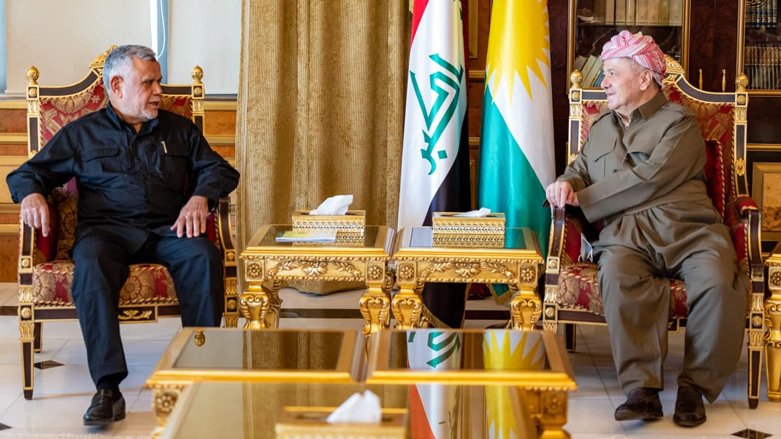Ameri Heads to Barzani for Talks as Baghdad Weighs KRG Salary Loan

As the salary standoff between Baghdad and Erbil intensifies, high-level political meetings are underway to prevent a rupture. Hadi al-Ameri, head of the Badr Organization, is expected to visit KDP leader Masoud Barzani as soon as Sunday on behalf of the Iran-aligned Coordination Framework.
Context: The Iraqi Finance Ministry’s decision to suspend public sector salary payments in the Kurdistan Region has triggered a new phase in Erbil–Baghdad tensions. With Eid approaching, reports suggest Prime Minister Mohammed Shia al-Sudani is considering authorizing May salaries as a temporary loan to ease tensions—though no final decision has been announced. The KDP has set the holiday as a deadline, demanding resolution before taking further steps.
Internally, the KDP’s Central Committee is expected to meet Monday with the presence of Masoud, Nechirvan, and Masrour Barzani. Senior party figures are reportedly discussing withdrawal from Iraq’s political process—both government and parliament—if no breakthrough is achieved. Separately, Masoud Barzani has sent a warning to Sudani, reportedly shared with both the U.S. Ambassador and the UN envoy, suggesting that continued delays could jeopardize the Prime Minister’s hopes for a second term.
Analysis: While the KDP remains a formal part of the state administration coalition—the cross-sectarian alliance that brought Sudani to power—its recent political conduct has raised alarm in Baghdad. These moves include outreach to the United States, the signing of gas contracts with American firms, increasingly vocal calls for systemic change in Iraq, and reported intelligence-level engagements with regional actors. Within the Coordination Framework, such steps are seen by some as provocations—or early signs of strategic realignment.
Ameri’s visit, while framed as diplomatic outreach, is widely seen as an attempt to reassert control and probe whether the KDP’s recent behavior signals a break from the current power-sharing model. The mission reflects growing unease within the Framework, which suspects that Barzani may be positioning the KDP for a more autonomous or oppositional role on the federal stage.
Prime Minister Sudani, meanwhile, is weighing a short-term concession that may temporarily de-escalate tensions without addressing their root causes. Sources suggest he may authorize the May salary payment as a loan to ease pressure ahead of Eid. However, this should not be mistaken for a shift in Baghdad’s broader approach; it is likely a one-time gesture, with the rest of 2025’s salaries remaining in jeopardy.
In parallel, Barzani has reportedly delivered a direct warning to Prime Minister Sudani, cautioning that continued delays in resolving the salary crisis could undermine his prospects for a second term. According to a local report, the message was also conveyed to both the U.S. Ambassador and the UN Secretary-General’s envoy—an indication that the KDP is not only escalating the dispute but also internationalizing it.
Even the opposition parties in Kurdistan, long critical of the KDP and PUK, are striking a more balanced tone. They describe Baghdad’s decision as politically motivated and unjust, but also accuse the KDP and PUK of failing to return oil revenues to the regional treasury or transfer them to SOMO, as required by federal law. “Instead of stopping the smuggling of KRG oil,” said opposition MP Soran Omar, “Baghdad is punishing powerless public employees caught in the middle.”
This dual criticism reflects a deeper political reality: neither Baghdad nor the ruling parties in the Kurdistan Region are viewed as fully credible by the public or opposition. Ultimately, the crisis is no longer just about missed salaries—it is exposing the fragility of a political system that neither side, nor the people, fully trusts anymore.









